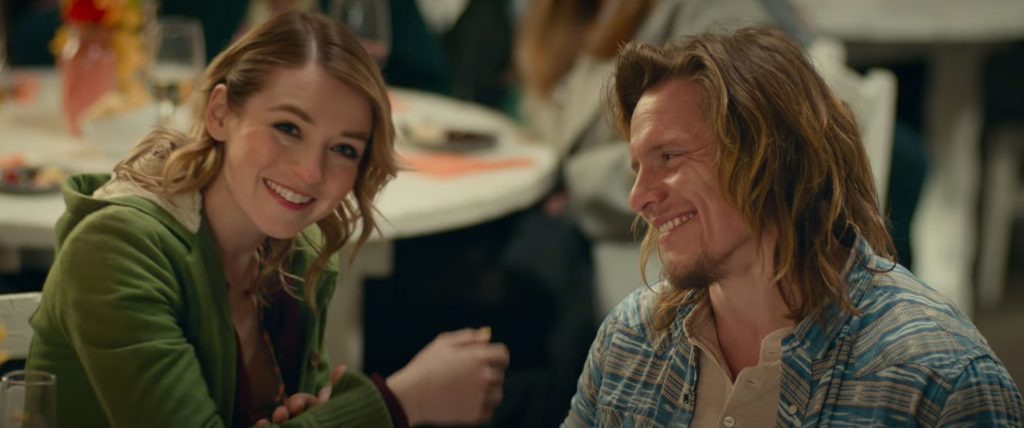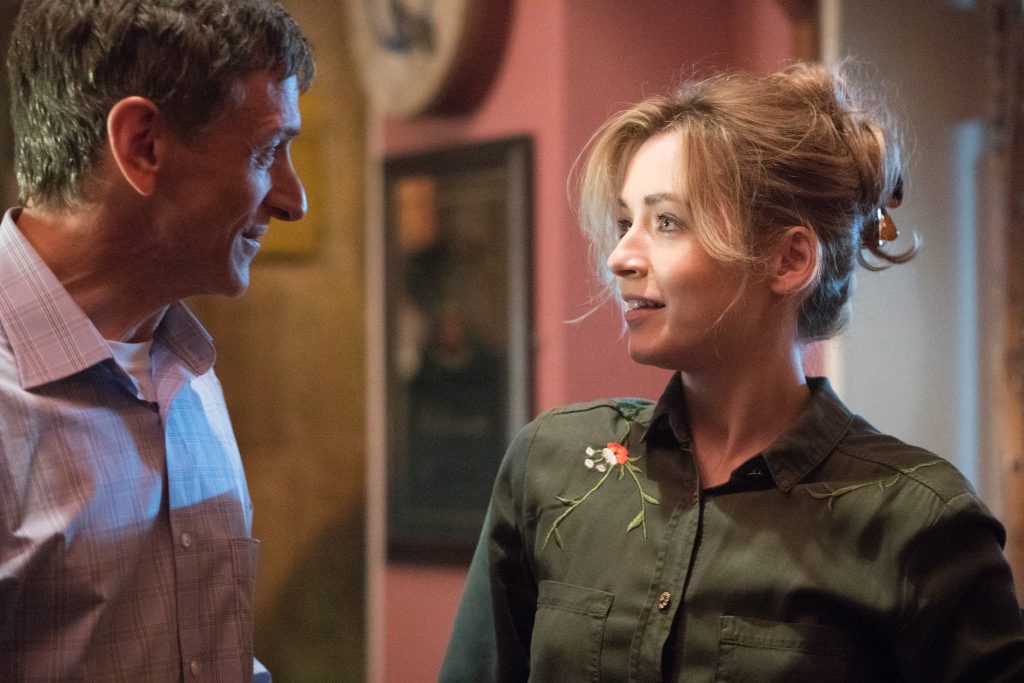April 25, 2021
by Carla Hay

Directed by Jeff Rosenberg
Culture Representation: Taking place in an unnamed U.S. city, romantic comedy “We Broke Up” features a predominantly white cast of characters (with some African Americans, Latinos and Asians) representing the middle-class.
Culture Clash: A live-in couple in their early 30s, who have been together for 10 years, break up the day before they travel to her sister’s wedding and decide to keep their break-up a secret until after the wedding.
Culture Audience: “We Broke Up” will appeal primarily to people interested in watching lightweight, escapist entertainment about the ups and downs of romantic relationships.

It might be enough to make some people cringe that “We Broke Up” takes place mostly around a wedding, because weddings are an over-used plot device for romantic comedies. “We Broke Up” is not as cliché-ridden as it could have been, but it’s not a particularly imaginative movie either. What makes the film worth watching are the lead actors’ mostly believable and relatable performances.
Directed by Jeff Rosenberg (who co-wrote the screenplay with Laura Jacqmin), “We Broke Up” starts off with the breakup that’s in the movie’s title. Lori (played by Aya Cash) and Doug (played by William Jackson Harper), who are both in their early 30s, live together in an unnamed U.S. city and have been a couple for 10 years. Lori is a barista in a coffee shop, while Doug’s job isn’t mentioned in the movie but it’s implied that he makes more money than Lori does.
In the beginning of the movie, Lori and Doug are waiting for their takeout order at a restaurant and are acting slightly goofy with each other. As they’re waiting, Doug blurts out to Lori: “Marry me.” Her response is to vomit on his shoes. The next thing viewers see are Doug and Lori sitting stone-faced in their car and not saying anything to each other. Lori looks as if she’s been crying.
What did they say to each other after Lori vomited on Doug? That conversation is revealed later in the movie, but viewers next find out that Doug broke up with Lori because she said no to his marriage proposal. The timing couldn’t be worse, because the next day, Doug and Lori are supposed to go on a road trip to attend the wedding of Lori’s younger sister Bea (played by Sarah Bolger), and Doug is supposed to be one of the groomsmen at the wedding.
Lori assumes that Doug won’t be going to the wedding because of the breakup. But he insists on going because he feels obligated. For whatever reason, Doug calls himself “the king of the ushers” for the wedding. After some back-and-forth arguing, Lori agrees to go with Doug to the wedding. But she’s still reeling from the breakup and she makes a compromise with Doug that he can go to the wedding if they don’t tell anyone about the breakup until after the wedding. The wedding is taking place on a weekend, so Lori and Doug have three days to keep their breakup a secret.
Bea and her fiancé Jayson (played by Tony Cavalero) got engaged after knowing each other for only one month. Bea is in her early 20s, and Jayson (who’s about 15 years older than Bea) is a divorced dad with a young son, who is not at the wedding. Jayson (who’s an overgrown man-child and somewhat dimwitted) and Bea (who’s flaky and fickle) have the type of touch-feely giddiness with each other where they seem very much in love, but the people close to them have doubts that the relationship will last.
One of those doubters is Bea and Lori’s divorced mother Adelaide (played by Peri Gilpin), who disapproves of Bea and Jayson getting married because Adelaide thinks the marriage will be a mistake. But there’s nothing she can do to stop Bea and Jayson, so Adelaide is attending the wedding. Based on the interactions that Adelaide has with her two daughters, Lori is the one whom Adelaide has more respect for because she thinks that Lori is a more stable person than Bea.
Adelaide also approves of Lori and Doug being together—so much so, that Adelaide calls Lori and Doug her “favorite couple.” She’s elated to see Lori and Doug when they arrive at the Arrowhead Pines Lodge, where the wedding will be taking place. The lodge used to be a summer camp where Bea and Lori would go when they were children. In a meeting with the lodge’s event planner, Bea comments, “What is more fun than getting married at the place where you got your first period?”
Right away, the typical rom-com uncomfortable situations begin. Lori doesn’t want to stay in the same room as Doug, but all the rooms in the main part of the lodge are booked up. The front-desk clerk named Mike (played by Eduardo Franco) also tells them that there are no rooms available with separate beds, but a distant part of the lodge has a room available with a bunk bed. Mike says it will take a couple of hours to change Doug and Lori’s reservation, but when Jayson hears that Doug and Lori want to get a different room, he slips a bribe to Mike to speed up the process.
There’s a long stretch of “We Broke Up” that drags in the lead-up to the wedding. During the wedding rehearsal dinner, Doug makes a toast to the future bride and groom, by giving an emotionally moving and humorous speech about the first time that he met Bea. It was shortly after Doug and Lori began dating.
Bea was a middle schooler and drunk when she crashed her sled into a birdbath. Bea had to go to a hospital emergency room, and Doug and Lori spent time getting to know each other better while the two were in the waiting room at the hospital. In his speech, Doug mentions that this was a turning point in his relationship with Lori, when he knew that he felt like he could be a part of their family.
Bea and Jayson are very immature, and they have their wedding guests participate in a summer camp games that kids would play—except there’s heavy alcohol drinking and some marijuana edibles involved in this partying. The least interesting parts of “We Broke Up” are the scenes where the wedding party guests who are in their 20s and 30s play a game called Paul Bunyan Day. The Paul Bunyan Day scenes seem like a lot of filler.
The guests are divided into two mixed-gender teams: Team Babe (which wears blue) and Team Lumberjack (which wears red), and each team has to perform a set of challenges after chugging alcohol before each challenge. There are 11 golden axes that are hidden as part of the game. The object of the game is to be the team to collect the most golden axes. When people get drunk or stoned in a romantic comedy, that just means some silly hijinks will ensue.
Jayson’s best man is a neurotic named Ari (played by Kobi Libii) and the movie makes some bland jokes made about Ari being Jewish. For example, there’s a scene where Ari asks Doug which yarmulke he should wear at the wedding. He has a choice of five yarmulkes and can’t decide which one to wear, so he he repetitively analyzes each one. It’s a joke that falls flat.
Bea is the type of person who has a short attention span when it comes to deciding on a career. Her latest idea is to start a bespoke scrunchie business. The jokes should write themselves with that idea, but the movie doesn’t explore this comedic angle for enough laughs.
Jasyon has a co-worker named Roya (played by Azita Ghanizada), who lives in San Francisco. Roya has a British accent, she’s intelligent, and when she and Doug meet, they have come possible romantic sparks between them. Later, they spend some time alone and the movie shows whether or not Doug and Roya will act on this attraction.
Meanwhile, a good-looking guy named Eric (played by Zak Steiner), who is one of Bea’s former classmates from high school, is a wedding guest. Eric makes it clear as soon as he sees Lori that he’s romantically interested in Lori. Considering that Lori and Doug are no longer together but have to pretend to be a couple to everyone else, it’s easy to guess how the movie will make a potentially new love interest an extra complication for Lori and Doug.
The plot for “We Broke Up” isn’t as simple as Doug and Lori trying to keep their breakup a secret. There are two plot twists (one is more predictable than the other) that are fueled by insecurities when it comes to love. Observant viewers will notice that there’s an unspoken sibling rivalry between Lori and Bea. Lori might be feeling envious that her younger sister is in a happy romance, while Bea might be feeling envious that Lori seems to have the “perfect” relationship with Doug.
Some of what happens during these three days seems contrived for a movie, but the scenarios aren’t entirely far-fetched. Bea and Jayson are almost cartoon-like, but Lori and Doug are a more realistic couple, in terms of their relationship and how they deal with their problems. There are hints that the divorce of Lori and Bea’s parents (their father abandoned the family) has affected Lori and Bea in different ways. Lori is suspicious of marriage (which is why she said no to Doug’s proposal), while Bea is the type who falls in love quickly and has a tendency to bail on relationships if she thinks they’re too much hard work.
“We Broke Up” works the best when it shows the dynamics between Lori and Doug, because what happens to them during this wedding weekend is at the heart of the story. As Doug and Lori, Harper and Cash give very watchable and interesting performances. Despite some parts of the movie that are a little boring, the last third of the film is the best part, because it’s about reconciling people’s expectations of a relationship with the reality of what’s best for the individuals in the relationship.
Vertical Entertainment released “We Broke Up” in select U.S. cinemas on April 16, 2021, and on digital and VOD on April 23, 2021.


